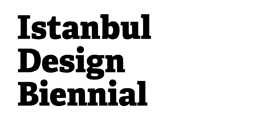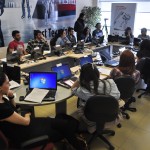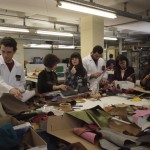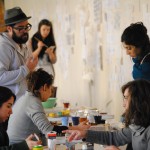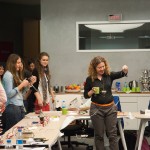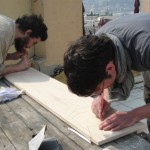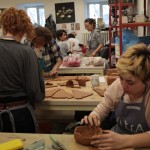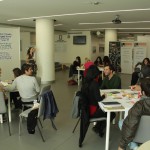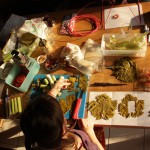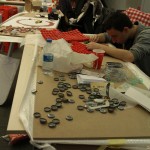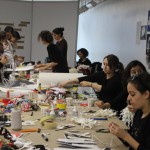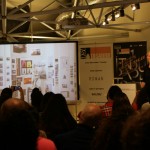The workshops held as part of the pre-events programme of the Istanbul Design Biennial reached completion.
The Istanbul Design Biennial organized a series of workshops between 22- 27 March with an aim towards creating a platform where various organizations, institutions, students and individuals representing the sector could meet, interact and learn from each other. Activities based on the Biennial’s theme of “Imperfection” provided opportunities for local and international professionals in creative industries and different brands to meet with university students and share experiences of thought and production processes.
Over a period of 6 days, in 11 different workshops taking place concurrently in 9 different locations, a total of 201 university students had the chance to work closely with approximately 30 international designers.
The international designers who came to Istanbul to participate in the Istanbul Design Biennial workshops included Max Lamb, winner of the Designer of the Future Award; Marc Bretillot, a leading name in food design; Luis Urculo, the renowned architect; Anon Pairot, the product designer especially renowned for her work with leading brands such as Hermes and Fendi; and Amina Agueznay, the jewellery designer known for her innovative designs using natural and everyday materials.
Sponsored by the co-sponsors of the Istanbul Design Biennial; Koray Group of Companies, Vestel, VitrA, Coca Cola, Matraş, Nef and ROMAN Hazır Giyim, the outcome of the Workshops encompassing all the works, ideas, products and the entire process itself will be exhibited in the venues/locations designated for the Biennial’s events programme. The information regarding the venues and events can be found in the Istanbul Design Biennial’s programme booklet and map.
The activities led by premier institutions and teams such as Design Quartier Ehrenfeld, Domaine de Boisbuchet, Made in Şişhane, SALON Amsterdam/Istanbul, Design and Innovation Initiative for Sustainable Life abd TAG Platform were realized in locations designated in consultation with the partner company.
All the participants came together at the Beyoğlu Gençlik Merkezi on Tuesday, March 27 to present the outcome of the workshops.
WORKSHOP PROGRAMMES
• Domaine de Boisbuchet Workshops
Domaine de Boisbuchet established by Alexander von Vegesack, member of the Advisory Board of Istanbul Design Biennial, and founder of the Vitra Design Museum organizes international workshops in architecture and design. Istanbul Design Biennial collaborated with Domaine de Boisbuchet in the realization of five different workshops led by five designers renowned in their respective fields.
Clay Ceramics Workshop with Max Lamb
Sponsored by VitrA and led by Max Lamb who was awarded by Design Miami/Basel with the “Designer of the Future” award in 2008, this workshop themed “Clay Factory” was realized in collaboration with Domaine de Biosbuchet, at the Ceramics Atelier of the Ceramics and Glass Department of Mimar Sinan Fine Arts University.
Students who attended this workshop organized as part of the preliminary event programme of the Istanbul Design Biennial produced 1.500 objects clay ceramics, gaining experience in this field under the supervision of Max Lamb for a duration of five days dedicated to 5 design executions. The workshop was aimed to emphasize the “Imperfection” value of hand-production as an alternative to serial-production. Getting off to a start with the production of 20 different objects in the short space of an hour, the works gained momentum. On the last day of the workshop, the students designed functional objects for serial production and presented 40 hand-made samples of these objects. Among the designs were objects for daily use such as a pencil case, napkin holder, candle holder, creamer, bowl, ashtray, Turkish coffee cup and pot, illumination unit, sauce tray, lavender crusher and dinner plate.
Food Design Workshop with Marc Bretillot
The workshop titled “Food of the Future” was led by the famous food designer Marc Bretillot and his assistant Jacobo Sarzi, hosted by the “Dükkan Steakhouse” in Armutlu, and attended by 13 students in creative disciplines such as architecture, landscape architecture, graphic design, gastronomy and communication.
Stating that we are not yet knowledgeable about the ways of providing an education in creativity, Bretillot argues for the necessity of creating environments – other than design schools – that can accommodate and encourage the birth of new ideas. Brettilot defines design as a way of asking questions. His workshop “Food of the Future” explored the relationship between the contemporary individual and food.
“Are the same products being consumed in big cities and small villages? If so, then is it going to continue in this way for the future generations? What kind of changes will the food of our grandchildren be subject to?” These were among the questions that were explored in the workshop. A vision of the food and drink products of the future was projected through the employment of frequently used products like gelatin, silicon, chocolate, fruit and vegetables. The participants produced various kinds of food such as hybrid vegetables and fruit comprising of lemons, kiwis, aubergines and courgettes; packaged foods and brand design foods. The “Food of the Future” Workshop utilized products were supplied by Tupperware.
Architecture Workshop with Luis Urculo
This workshop led by the renowned architect Luis Urculo and attended by 21 students was sponsored by NEF.
The workshop titled “Istanbul as a (Design) Battle Field” was realized in collaboration with Domaine de Biosbuchet, at NEF Bebeköy and was aimed towards the rediscovery of the city’s architecture through different methods.
Luis Urculo summed up the workshop process: “The work evolved in three stages. The fist stage was the making of drawings to define the city with invisible traces. Secondly, out of these drawings were selected various symbols that could define the city. And finally, a decision had to be made regarding the right materials to create a human printing press. But each stage had one thing in common and that was the existence of certain limitations. In the first stage, the participants had to produce as many drawings as possible that symbolized the reality in the venue in the space of 10 seconds. The second stage was the transference of these symbols created under limitations into linoleum which presents limitations in itself as it is a material quite hard to work with. By nature, this material does not allow the attainment of perfection. The last stage was the decision regarding the surface on which to print using this material. And regardless of what the surface is, fabric or wall or any other surface, achieving complete precision is out of the question. In the end many “imperfect” layers came together to reflect the reality of the city. In a sense, we can call this the “imperfect” representation of the urban content through the technique of camouflage. Of course what’s extraordinary here is that we are inspired not by nature but by urban texture to create a camouflage. All the works were created for Istanbul. The inspirational spaces were picked by the students in different parts of the city. So the outcome is different from what it would be in any other city of the world. All the designs bear the traces of Istanbul.”
According to Urculo, if we can manage to transcend the perception of scale and all the limitations presented by architecture, we can find new answers and discover tools that will re-define architecture. He said that the students’ works were inspiring and full of surprises.
The products that emerged from the workshop which explored the relationship between architecture and graphic design pushing beyond limits of the field, will be presented in Domain de Boisbuchet as well as the Istanbul Design Biennial.
Jewellery Design Workshop with Amina Agueznay
This workshop led by the Moroccan designer and architect Amina Agueznay who uses the influence of her architectural background and knowledge in the application of her unique jewellery design technique, was attended by 15 students of different disciplines. Realized in collaboration with Domain de Boisbuchet, and focusing on the theme of “Imperfection”, the workshop produced very interesting designs of necklaces, earrings, hats and bustiers using natural and daily materials like cardboard, paper and string. These products offering a different esthetic were created in ways that defied conventional perceptions, based on keywords such as beauty, temporality, improvisation, process, handcraft, transformation, and tolerance. The workshop was hosted by the Turkish Chamber of Architects Metropolitan Istanbul Branch.
Leather Design Workshop with Anon Pairot
Led by the Taiwanese product and furniture designer Anon Pairot and sponsored by Matraş, this worshop culminated in the production of 3 different collections consisting of 48 pieces created by 16 students and 8 technicians in the space of five days.
The departure point of the first collection by the participants was to re-define the concept of “Ugly” using the materials and accessories acquired from the Matraş factory. Arguing that a beautiful product cannot be produced without the understanding of the definition of ugly, the first collection was comprised of product designs such as hat boxes, hats, belts, bags, necklaces, gloves and notebooks. Drawing attention to the fact that in today’s world people consume without a sense of responsibility, the second collection focused on bag designs aiming to provide a solution to certain defined design problems. The final products of the third collection were creative designs comprising of at least two of such functions offered by capes, braces, sleeping bags, vests, sand bags and bags.
The collections based on the theme of Imperfection emphasized the handcrafting techniques in design processes. The workshop was realized at the Matraş Factory, İkitelli.
•Customization in Design – Vestel
Sponsored by Vestel and realized at the Vestek Research and Development Inc. located in Istanbul Technical University, the workshop themed “Customization in Design” was led by the Director of Vestel Household Appliances Industrial Design Group, Murat Hondu and a specialist designer from the team of Vestel Household Appliances Industrial Design Group, Nuray Işık.
The participants were students at the departments of industrial product design, graphic design, interior architecture and environmental design of the universities of Marmara, TOBB, Okan, Ege, İzmir Economics, Yıldız Technical, Yeditepe and Maltepe. The participants analysed the characteristics of 17 designated cities (İzmir, Van, Mardin, Konya, Antalya, Çanakkale, Ankara, İstanbul, Kayseri, Hatay, Gaziantep, Adana, Kastamonu, Eskişehir, Kütahya, Bursa, Trabzon) and customized a refrigerator design in line with the features of these cities.
In the first stage of the workshop, the students were asked to study the 17 designated cities in terms of their history, cultural texture, food culture and habits and distinctive life-syles; and topresent themes and keywords for the selected city. They were then expected to create designs based on these themes, whilst keeping functionally and esthetically in line with the “customization” theme.
•Design for All Workshop – TAG Platform
Led by TAG Platform specializing in creating awareness of urban design, and sponsored by Koray Group of Companies, this workshop explored the relationship of the streets and the people with the city and its design related problems. The workshop was attended by 16 university students and run by the members of TAG Platform Banu Binat, Erkan Nazlı, Neslihan Şık, Zekiye Nazlı and EIDD (Design for All Europe) representative Pete Kercher and Yelta Körn.
For the workshop, the Karaköy Area with its diferent means of transportation (ferry, bus, tram, car, etc), different urban structures (bridge, subway, park, carpark, etc) and different urban functions (commerce, transport, tourism, etc) and different urban users, was selected.
The workshop evolved in three stages. The first stage began with the participants adopting different roles to experience the city. Divided into groups of two, they analysed all daily life activities involving roads, pavements, public spaces and transportation alternatives whilst immersed in different identities. In the second stage, the information gathered from these experiences were mapped out, evaluated and visualized through different readings of the space and the designation of key stations. In the final stage, a campaign was designed to make all the readings and observations of the city available to all the users of the city, and not just the concerned few.
For the purposes of the campaign, the obstacles encountered by the daily users of Karaköy were re-constructed as humourous games such as bench-hopping, egg-carrying and bus-barfix within the concept of the olympic games. Following the workshop, and during the period up to the Istanbul Design Biennial, the Karaköy Olympics Campaign is targeted to reach a wider public drawing the attention of general users to the designed/undesigned areas in the city.
•More Than Design Workshop – Design Quartier Ehrenfeld & Made in Şişhane
Run by the Istanbul-based “Made in Şişhane” and Cologne-based German initiative “Design Quartier Ehrenfeld”, the “More Than Design” workshop was realized as part of the preliminary events programme of the Istanbul Design Biennial.
Led by Aslı Kıyan İngin and Sabine Voggenreiter, the workshop was targeted towards creating a debate and a new approach for contemporary design around the theme of Imperfection. Both the runners and the participants of the workshop were given an opportunity to try out design-production models such as designing and producing in a short time-span – whilst making use of neighbourhood networks like Şişhane and Galata where small-scale production is still alive – that are specific to Istanbul.
This workshop aiming to reveal the full potential of illumination manufacturers in the Şişhane area was participated by students of Siegen and FH Mediadesign Düsseldorf, along with students from the industrial design, architecture, interior architecture, visual communication, graphic design, film and media departments of various Turkish universities. The workshop was led by industrial designers Felix Stark, Jörg Mennickheim, product designers Katharina Pawlik, Pierre Kracht, fashion designer Nicole Suess and designer/architect Ulrich Exner.
10 German students and 20 Turkish students participated in the workshop and benefited from the opportunity to discover this unique laboratory and the information flow therein as an alternative to contemporary design world and serial production; and to be a part of the collaborative process between the craftsman and the designer.
During the workshop, the participants teamed up with the German designers touring the small-scale production ateliers in Şişhane. Six different products ranging from special illumination units to furniture were designed for each of the following venues: Gündoğdu Cafe in the Galata Square, Okçu Musa Primary School, the famous Doğan Apartments ion Serdar-ı Ekrem Street, the reception of Manzara Istanbul, the historical Tünel Arcade and a familiar tea shop in the Şişhane area. The production of the designs began in the small-scale ateliers located in the area. The products of the design-production process completed in the short time span of five days, the film recording these processes, the booklet and the posters will be exhibited in their own venues throughout the Istanbul Design Biennial. The same exhibition will then travel to Cologne in Germany to meet the audience at the Passagen Design Festival 2013. The documentation of the More Than Design workshop will focus not only on the process, stories and experiences but also the intricate relationship between historical and topical information.
The “More Than Design” workshop was hosted by various ateliers in the Şişhane region as well as the Turkish Chamber of Architects Metropolitan Istanbul Branch, Karaköy.
•SALON/ Amsterdam – Istanbul
Established by Cathal McKee, Gijs Stork and Manon Schaap as a center dedicated to creating inspirational dialogues and experiences in art, design and fashion SALON/Amsterdam ran a workshop sponsored by ROMAN Hazır Giyim as part of the Istanbul Design Biennial. The workshop was organized collaboratively by the Royal Netherlands Consulate and the Dutch DFA as part of the celebrations for the 400th anniversary of Dutch-Turkish diplomaitc relations, and was hosted by Material ConneXion Istanbul in Yapı Endüstri Merkezi.
SALON/ ran a workshop targeted towards the transmission of designers’ works and ideas through visual presentations while collaborating with the creative industries, craftsmen and designers based in Istanbul. During the workshop, a round table discussion took place whereby the designers communicated their works, ideas and philosophies via visual presentations and responded to the students’ questions. In this way a dialogue exchange was made possible between the designers and participating students.
SALON/Amsterdam also provided opportunities of encounter between fashion and product designers such Mattijs van Bergen, Vroonland, Desiree Hammen, Hyun Hyeu, BCXSY, Antoine Peters, Borre Akkersdijk, Noman and Reinier Bosch who travelled to Istanbul for this project, with various organizations and ateliers that could offer co-operation.
These young and independent designers working on new ideas and techniques shared their knowledge of legacy and craft, the significance of the unique, and the confrontational encounters between hand-crafting techniques and new technologies, with the artists, designers, craftsmen and producers of the creative industry in Istanbul. The sites visited by the designers and the students included the ateliers where the art of Ebru painting is performed, the Topkapı Museum which houses Turkish carpets, caftans and seating groups, leather ateliers, artisans’ shops in Tahtakale and the rug sellers in the Sultanahmet area.
In the period up to the Istanbul Design Biennial, the designers will use their experiences and observations of the unique characteristics of Istanbul to create products that pay homage to their originals by clearly revealing their ties to them. The project exhibitions will also travel to Amsterdam following their run in the Istanbul Design Biennial.
•Happy Designs With Re-cycled Materials – Istanbul Design Biennial Team & Coca-Cola
This workshop was led by the Istanbul Design Biennial Director Özlem Yalım Karaoğlu and the team member Merve Yücel and was sponsored by Coca-Cola.
The workshop began with works on happiness conducted by the Coca-Cola Design Team and mind-opening presentations on re-cycling methods, materials and designs. It continued with exercises exploring the ways in which various re-cycled materials such as drink cans, bottles and bottle caps, billboards, advertizing strips and canvases provided by Coca-Cola can give form to designs; and various methods of use.
There was also an exchange of ideas on happiness with 19 students studying a wide range of creative subjects from industrial design, to fashion and textile design, from architecture to cinema and television. Among the products created around the theme of happiness were a hopscotch platform and a pulpit to be installed in public spaces, a coat and a pair of shoes designed in the context of a social responsibility project, an illumination unit, a wedding dress, a musical instrument, a chest, a happiness clock, a wheel of fortune, a picnic basket and a kaleidoscope.
The workshop took place in the Altunizade office of Coca-Cola and the products will be exhibited throughout the Istanbul Design Biennial in a venue later-to-be-confirmed.
•Design For Basic Needs Workshop – Design and Innovation Initiative for Sustainable Life
This workshop was run by Design and Innovation Initiative for Sustainable Life led by Merve Titiz, Pınar Öncel and Tuna Özçuhadar. Aiming to push the conventional perception of sustainability further towards a deeper understanding of the concept, the workshop was realized with the venue support provided by the Turkish Chamber of Architects Metropolitan Istanbul Branch.
The workshop, with 18 attending students, was targeted towards contributing a different perspective on the concept of “Imperfection” – the main theme of the Istanbul Design Biennial – and was based on the categorization of needs put forward by the Chilean economist Manfred Max-Neef. The concept of “Imperfection” was studied not in terms of production and products formed by technologies, engineering and design but in view of human needs.
While questioning the extent to which the products meet the basic human needs, the workshop explored the role of design and evaluated the innovation potential emerging from this point of view, employing the creative working methods of World Café.
